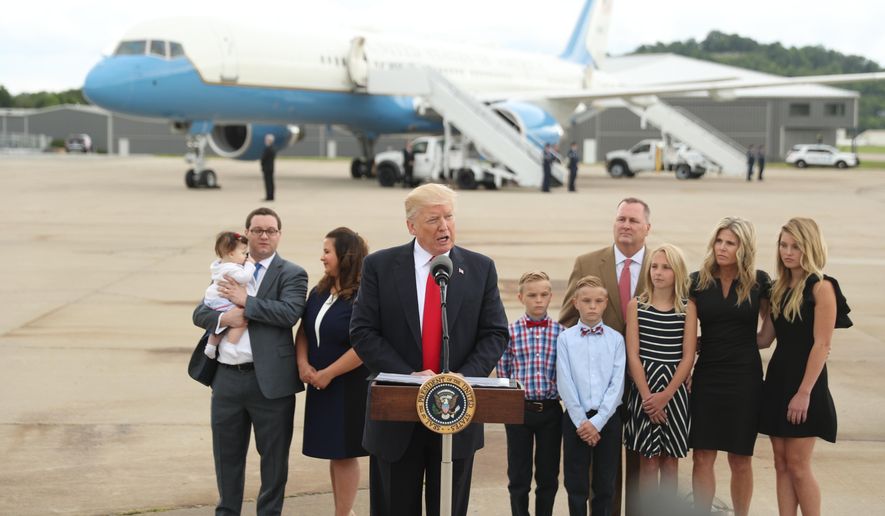President Trump highlighted the “victims” of Obamacare on Wednesday as part of his push to get a health bill from Congress, saying the program is in “absolute turmoil” and driving up costs even as his GOP allies struggle to reach consensus on a better plan.
Standing on a tarmac in Cincinnati, Mr. Trump said premiums have “exploded” in Ohio and other states. A major player, Anthem, announced on Tuesday it is leaving the Obamacare exchange in Ohio, likely leaving nearly 20 counties without an option next year.
“Obamacare is in a total death spiral, and the problems will only get worse if Congress fails to act,” Mr. Trump said. “Obamacare is dead. I’ve been saying it for a long time.”
The 2010 Affordable Care Act promised to drive down health care costs by allowing Americans to shop for coverage from competing insurers on web-based exchanges, often with the help of taxpayer-funded subsidies, yet the program fell short of enrollment totals. Insurers said they’re struggling to make money on sicker-than-expected customers and can’t abide Mr. Trump’s wavering commitment to the law, so they’re bailing or raising their prices.
Mr. Trump argues the law itself is solely to blame. He met with two families who say they were adversely affected by the law, before moving on to a bigger speech on his infrastructure plans.
Raya Mafazy Whalen and her husband, Michael, own a commercial playground-equipment company in Ohio and provided their 15 employees with health coverage before Obamacare’s implementation.
When their plans ran afoul of the new law’s coverage requirements, they were forced to seek coverage on the new insurance exchanges, according to the White House. They said the coverage wasn’t affordable and wasn’t accepted by their preferred OB-GYN when Mrs. Whalen became pregnant with their first child.
Dan Withrow, president of DSS Distribution Group Inc., in Louisville, Kentucky, said the cost of health care options for his employees spiked by up to 150 percent following the advent of Obamacare.
Mr. Trump focused on how they were harmed by Obamacare, rather than what the emerging GOP plan might be able to do for them.
The Congressional Budget Office estimated the House version of the plan would result in 23 million fewer people holding insurance a decade from now. While healthier people in some states would pay much less, older and sicker consumers could see their costs soar, analysts said.
“The House of Representative has done it’s job, it sent a plan to the Senate, and the Senate is working it over,” Mr. Trump said.
Senate Majority Leader Mitch McConnell said Tuesday that negotiators are “close” to crafting their own bill and counting up the votes, though potential sticking points remain.
During a closed-door meeting Tuesday, GOP leaders floated the idea of letting states waive Obamacare’s essential health benefits but not its “community rating” provisions, which require insurers to charge healthy and sicker people the same amount, according to Senate aides.
The House bill included federal funding to subsidize sicker people who would see higher prices, though the CBO suggested it wasn’t enough, so those with preexisting medical conditions might be priced out of the market.
Yet allowing insurers to charge healthier people less is a key priority for conservatives, who say it’s the best way to drive down premiums.
Changes the existing House bill would have to go back to the lower chamber, or differences could be smoothed out in a House-Senate conference and voted on again. Watering down the waiver system would likely upset members of the archconservative House Freedom Caucus, who insisted on letting states scrap community rating before rallying behind the plan en masse this spring.
“We thought community rating was pretty important,” said Rep. Jim Jordan, Ohio Republican, on Wednesday.
The group’s support gave the bill the grease it needed to pass, 217-213, on May 4.
However, Senate efforts to move the bill to the center could attract House GOP moderates who refused to back the initial version.
Another Senate proposal would provide states that vastly expanded their Medicaid populations under Obamacare a softer landing than the House bill, which froze generous federal funding for the expansion population in 2020. The idea is to phase out the generous matching funds more gradually, over three years, though some centrist Republicans have said they’d like to keep the expansion for even longer.
Lawmakers and aides said the ideas are still just proposals, so the contours of the plan could change as negotiators draft actual legislation.
Mr. Trump on Wednesday said Democrats were standing in the way of progress, even though Republicans are operating under fast-track budget rules that allow their 52-seat Senate majority to avoid a filibuster of their plans.
Democrats say they’ll work with Republicans to bolster U.S. health care markets, but only if GOP leaders take repeal off the table.
• Tom Howell Jr. can be reached at thowell@washingtontimes.com.




Please read our comment policy before commenting.